Running Seven Marathons in Seven Days For Multiple Sclerosis
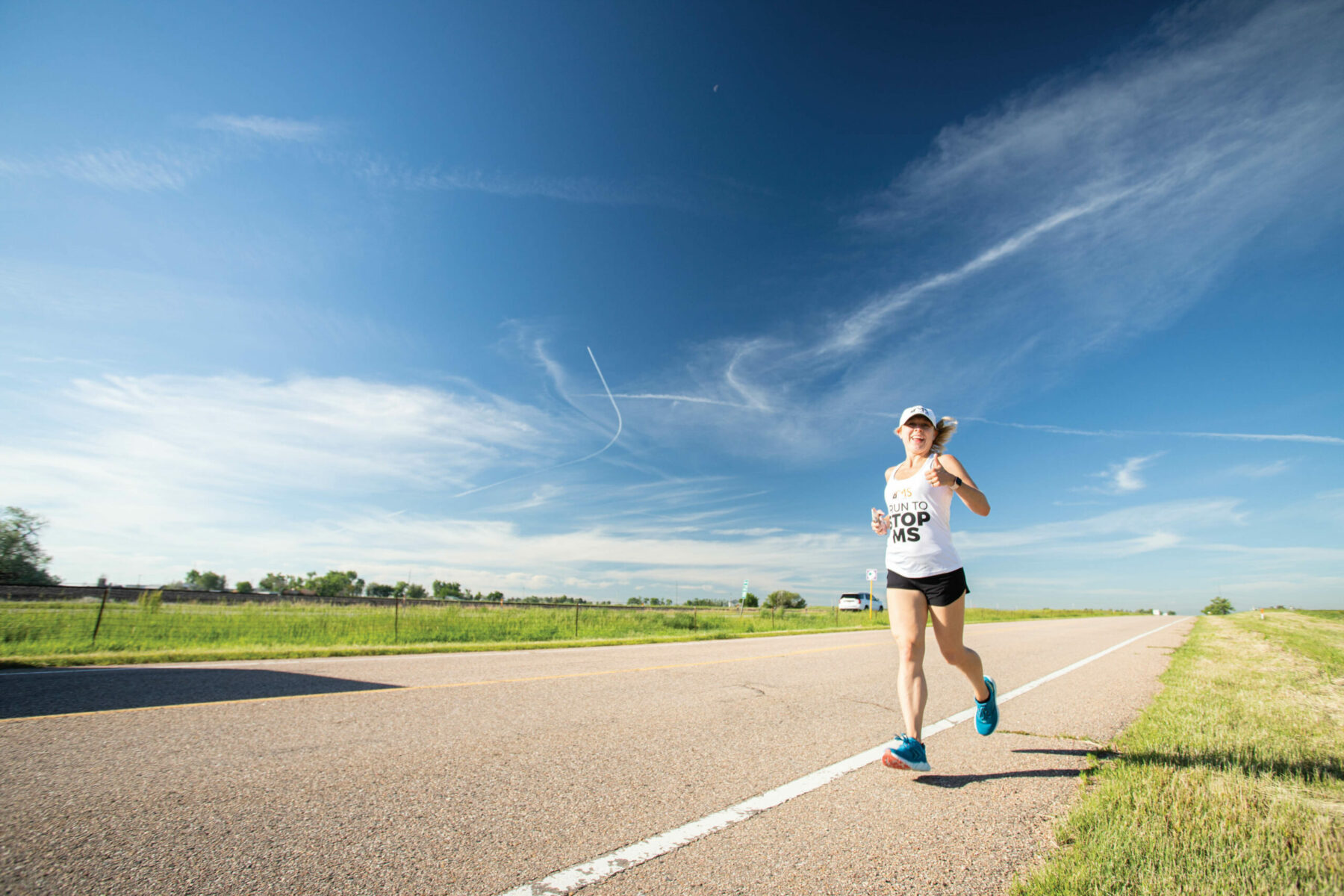
Two years ago, Regan Zuege signed up to run about seven marathons in seven days. The problem? The longest she had ever run at the time was four miles.
Zuege is an Austinite, wife, mother of two and runner living with multiple sclerosis. In 2021, she participated in MS Run the US, running 178 miles in seven days, and raised over $27,000 for the organization. The nonprofit is devoted to raising awareness and funds to support those living with MS.
Her journey started in January 2015 when Zuege suddenly started having strange sensations, including double vision while exercising and tingling throughout her body. Zuege’s mother-in-law encouraged her to visit a neurologist who eventually diagnosed her with MS. This came as a surprise to Zuege, who was living in Denver at the time, as she was living a fairly active lifestyle.
“I never thought (MS) would be a part of my story,” Zuege says. “You just think nothing like that is ever going to happen to you(…) You feel invincible until you’re not.”

Photography credit to Brian Fitzsimmons
However, MS wasn’t new to Zuege — her grandmother had MS and Zuege worked at the National MS Society. But her prior exposure to MS impacted her expectations of how the disease would affect her. Growing up, Zuege’s grandmother, who was diagnosed later in life, had a severe case of MS in which her health deteriorated until she was unable to walk when she passed away. Zuege wasn’t sure if the same would happen to her.
Luckily, Zuege was able to get immediate treatment and started doing monthly infusions, which alleviated most of her symptoms. Today, she still struggles with some tingling in her hands and legs while working out.
“It took me a while to realize this is my normal,” Zuege says.
Zuege continued to exercise, viewing fitness more so as a privilege than an obligation. She started looking at MS as fuel rather than a limitation.
“The game changer for me (was) thinking of people like my grandmother and people from the MS Society who were never going to walk another day in their life,” Zuege says. “At that point, I had to stop thinking of training as a burden and start thinking of it as a gift.”
The Run
About a year after her diagnosis, Zuege and her husband moved to Austin, and in 2017 and 2019, they had two kids. After her second child, she decided to start getting back into shape, doing a little bit of everything — hiking, kickboxing, indoor cycling, HIIT, weightlifting. But the one thing she refused to do was run.
“I still have horrible memories of going on a beach vacation, seeing all the people running on the beach and thinking that must be so nice,” Zuege says. “And one time I set out to do it, and I literally almost passed out.”
Zuege hated running so much that she admits she used any excuse to deliberately avoid the running portion of her fitness classes. But when COVID-19 hit, she could no longer go to the gym for exercise, and running seemed to be the only option.
So she started out slow, switching between one-minute intervals of running and walking. Eventually, Zuege gradually built up to running her first mile — only a year and a half before she ran 178 miles for the relay. Around this time, it clicked in her mind how running can be enjoyable, as she felt a strong sense of accomplishment after running.
“Being able to celebrate the small things makes you more proud of yourself as you’re doing it,” Zuege says.
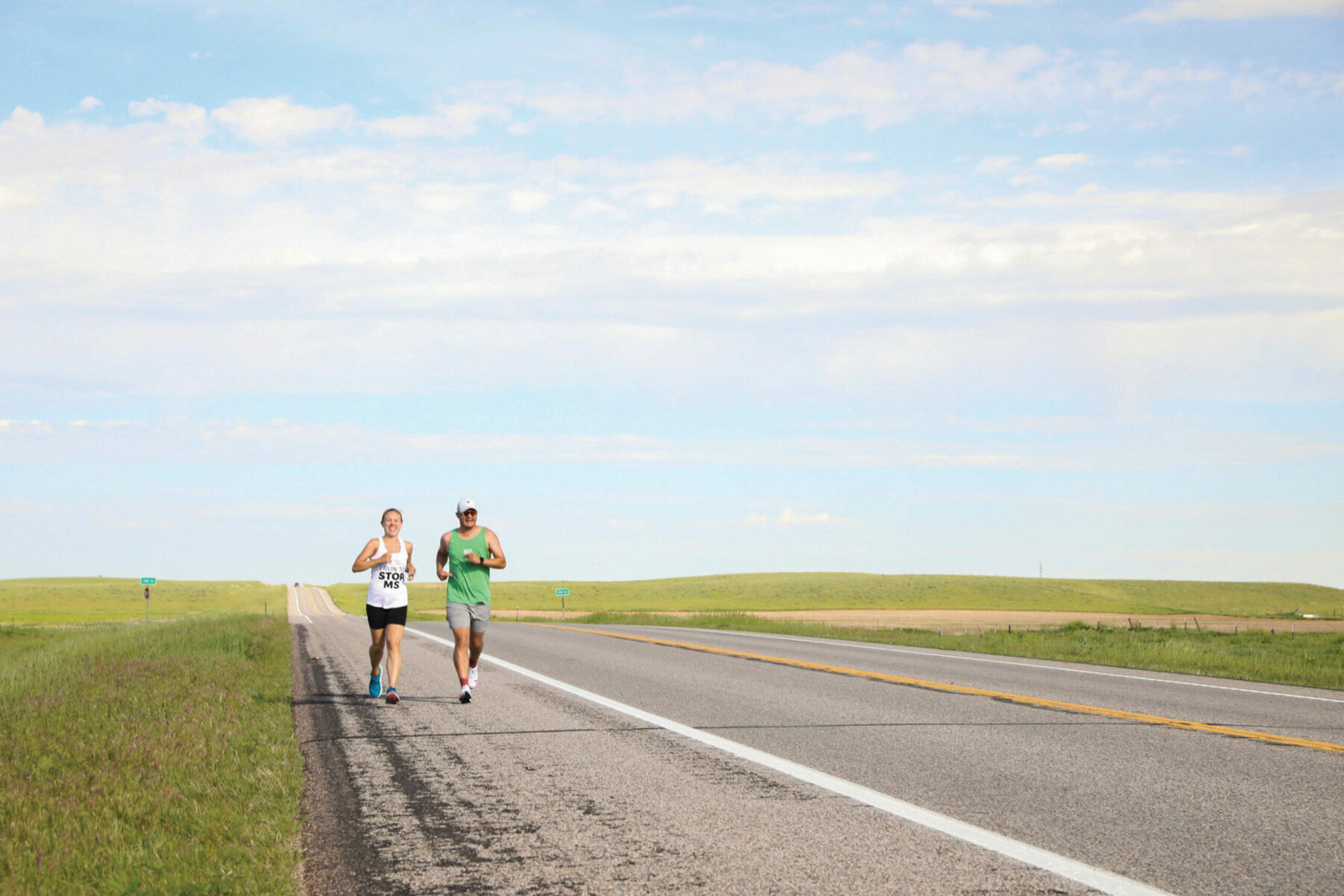
Over time, she built up to run four miles and decided to look for 5Ks to run for MS. While browsing online, she came across MS Run the US, a 19-person relay that spans the United States, covering 3,260 miles total. Every year, the relay starts in April in Santa Monica and ends in August in New York City. Each runner who signs up commits to fundraising at least $10,000 over a 10-month period and running about 160 miles for six consecutive days during their assigned segment of the relay.
As expected, many of the runners are ultra-marathoners, unlike Zuege. She immediately exited the web page, believing she’d never be able to complete a race like that. But even after the race left her browser, it never left her mind.
“I felt this strong pull to it,” Zuege says. “I just kept feeling like there’s a reason I can’t forget about this.”
Finally, something clicked in her mind, and she realized she could do the race. As Zuege was reading online about other runners with MS who have done the race, she gained confidence in herself which solidified her belief that she could do it.
“The only thing limiting myself is me and my concept that I don’t think I’m able to do this,” Zuege says. “If I can shift that mentality and believe body, mind and soul that I can do this, I genuinely think I can.”
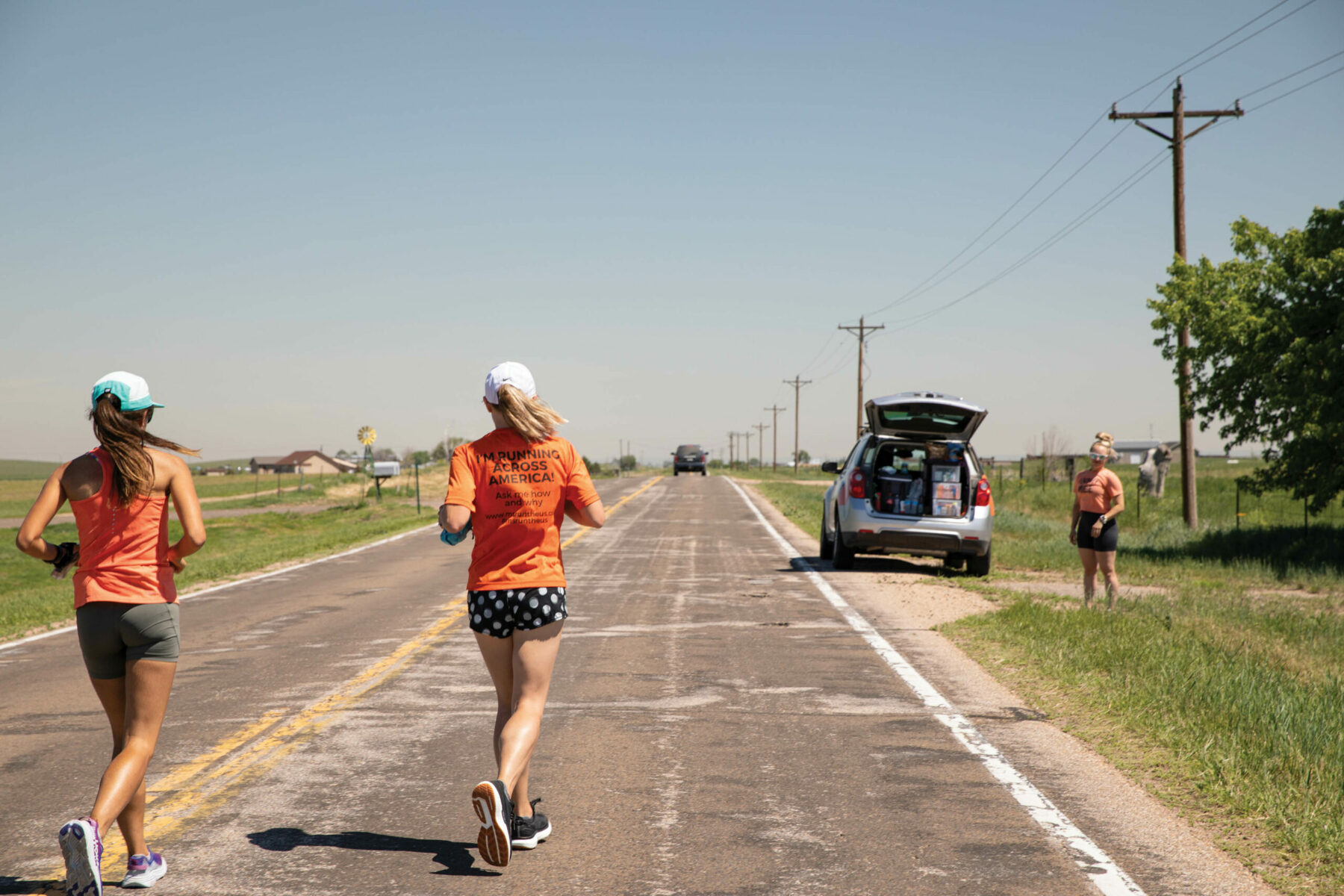
So Zuege reached out to the relay’s founder, Ashley Schneider, and convinced her to let her do the run. The process for selecting runners for the relay is fairly selective, and Zuege believes that because she had confidence in her ability to run the relay, she was able to talk Schneider into letting her apply. Zuege was eventually selected, and she started her journey of training.
In January 2021, Zuege ran her first half-marathon. From there, she used that as a foundation to build her training on over the next five months with her relay segment being in June. She trained diligently with a run coach, knowing that being a newer runner makes her more prone to injuries.
During her peak training season, Zuege spent 12 hours a week running. She estimates that she ran approximately 1,000 miles total, averaging 9- to 10-minute miles. Zuege says she never skipped a day of training — even in the midst of the winter storm — because she knew that would only make it easier for her to continue to skip.
“(Skipping is) how people fall out of routines,” Zuege says. “So I never let myself think any part of training was optional.”
The Relay
By June, Zuege was race ready. Her segment was in Eastern Colorado, which had a much flatter terrain than the western segment. Each runner has access to the relay road crew that travels in an SUV along their route as well as an RV that stops at each campsite along the way. Every few miles, she would stop with the SUV to rest, eat and recharge before continuing her trek across Colorado.
Each day, Zuege ran for about six hours, starting before sunrise and ending by 12:30 p.m. to rest and recover for the remainder of the day. She spent most of the time running, but a good portion — probably around a fourth of the relay — was spent walking. By the end of the relay, she was averaging 12-minute miles.
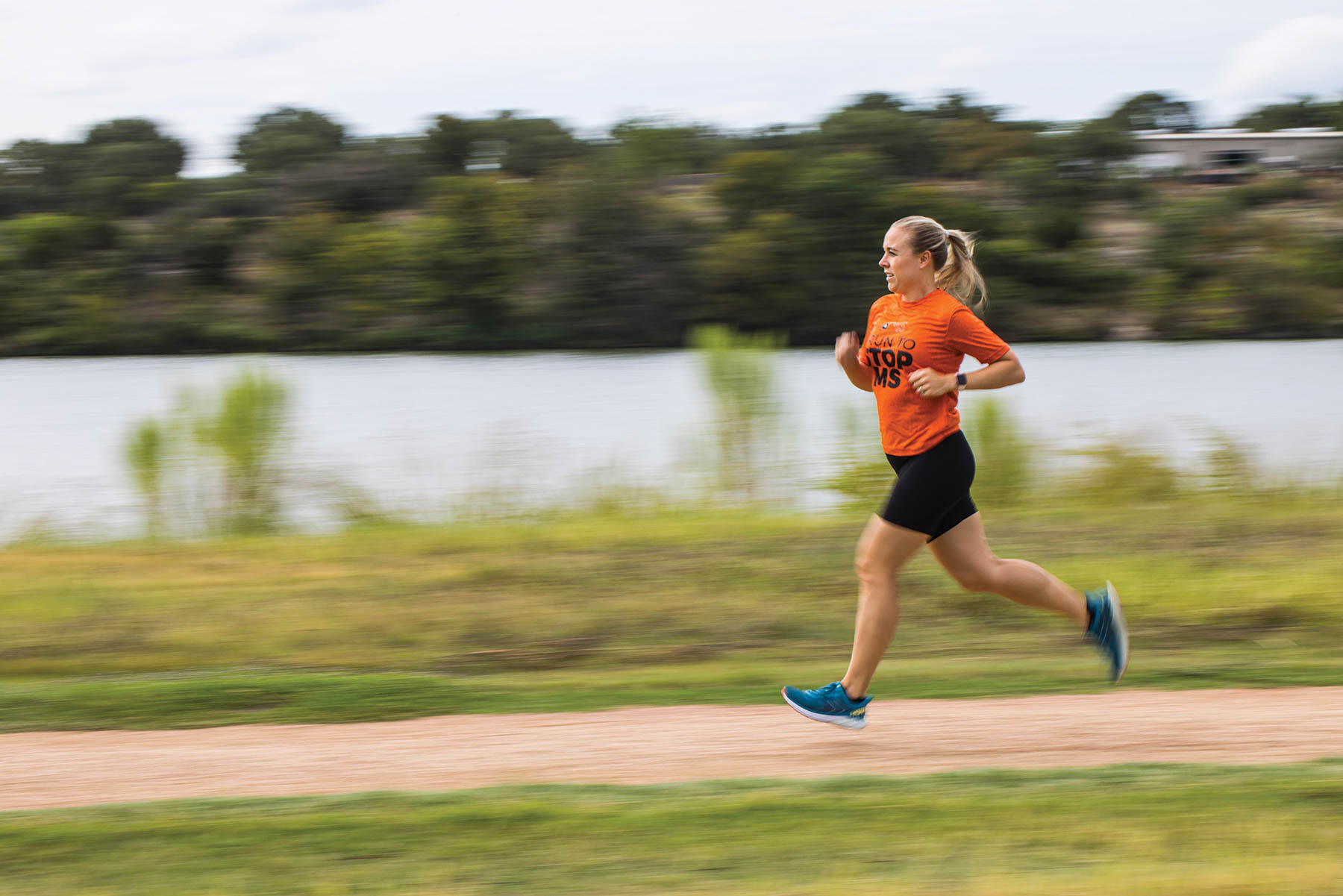
Photography credit to Brian Fitzsimmons
One of the hardest parts of the run wasn’t necessarily the actual running, Zuege says, but rather the sunburns, sun rash and blisters that came with running for long periods of time directly facing the sunrise. However, at the end of the day, Zuege got the chance to spend time with her family as they stayed along the route. She also got to do an ice bath in a unicorn pool, a memory she’ll forever cherish.
During the race, Zuege also got the opportunity to meet a lot of new people, including the road crew and the runner of the previous segment. Since the race, she’s even been able to connect with other MS runners.
“Before going into this, I didn’t know a lot of people my age who were fit, passionate about staying healthy and active, and had MS,” Zuege says. “There are millions of people who have it, but you would never know because most people who have MS look and seem very normal.”
The Reflection
Looking back on the race, Zuege still claims she would do it all over again. By the end of her segment, she was ready physically, emotionally and mentally to cross that finish line.
“There was never I moment that I wondered, ‘Am I really going to finish this? Am I totally crazy for doing this?’” Zuege says. “It was just this solidified belief.”
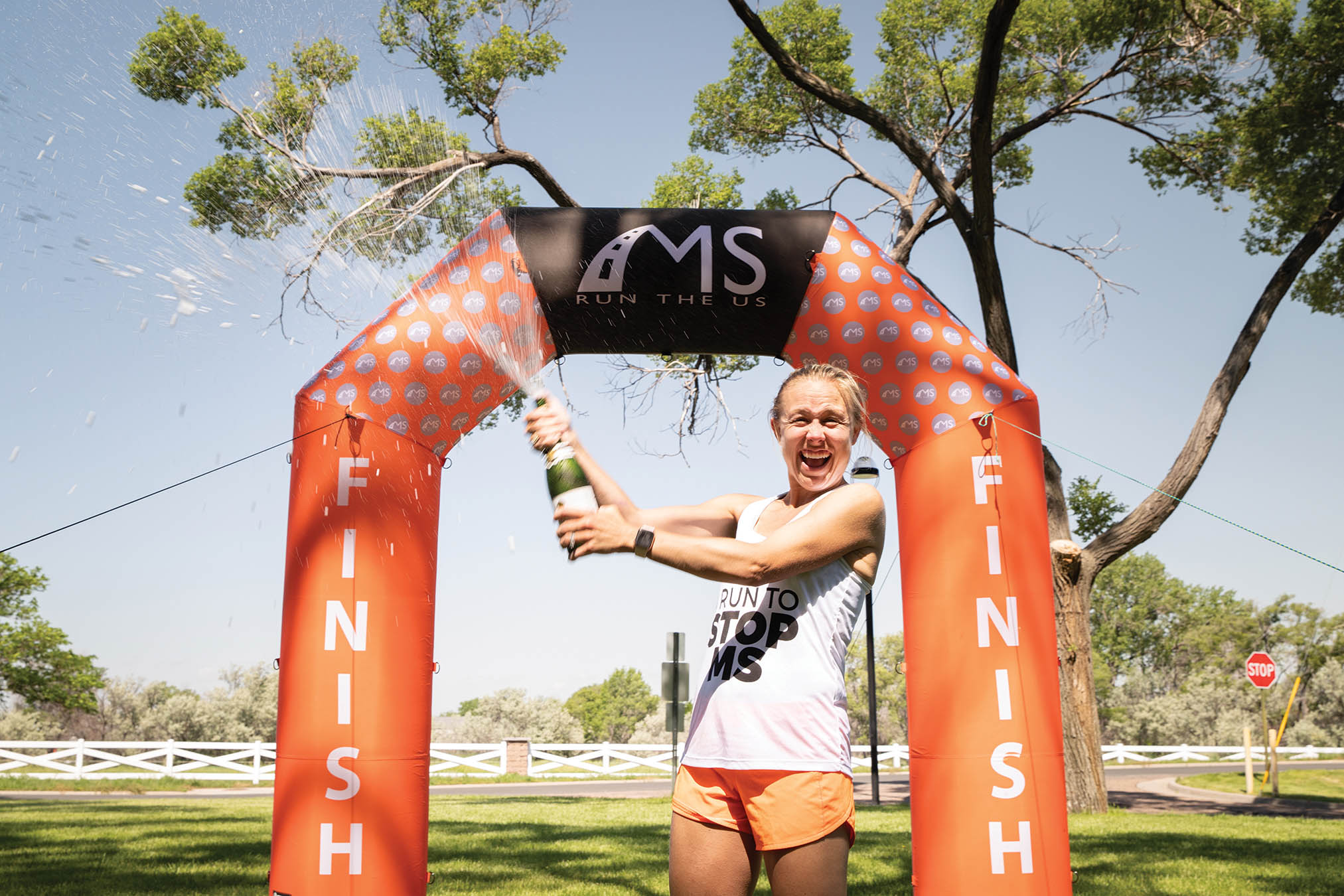
Even most of her community was extremely supportive when Zuege first told them about the race. In the same way that they believed in her, she believed in herself, which helped propel her throughout her journey of training and running the relay. She says having a positive attitude and choosing joy can make a huge difference in the way you perceive unforeseen circumstances, whether it be an unfortunate medical diagnosis or an injury to your body.
“I won’t say you can overcome anything because that’s naive to think that,” Zuege says. “But a lot of times, we limit ourselves with the way we perceive certain situations.”
Zuege says it’s tempting to have a negative mindset when you experience something you weren’t expecting. However, she says maintaining a positive attitude and acknowledging the difference between your expectations and reality can help you have a more open mindset when faced with adversity.
“(The solution) might not look like a cure, (but) if you hold onto positive, you can find light even in dark places,” Zuege says. “Even in the darkest moments, I held onto the little bit of light I carried with me and allowed those moments to sharply contrast with the highs.”
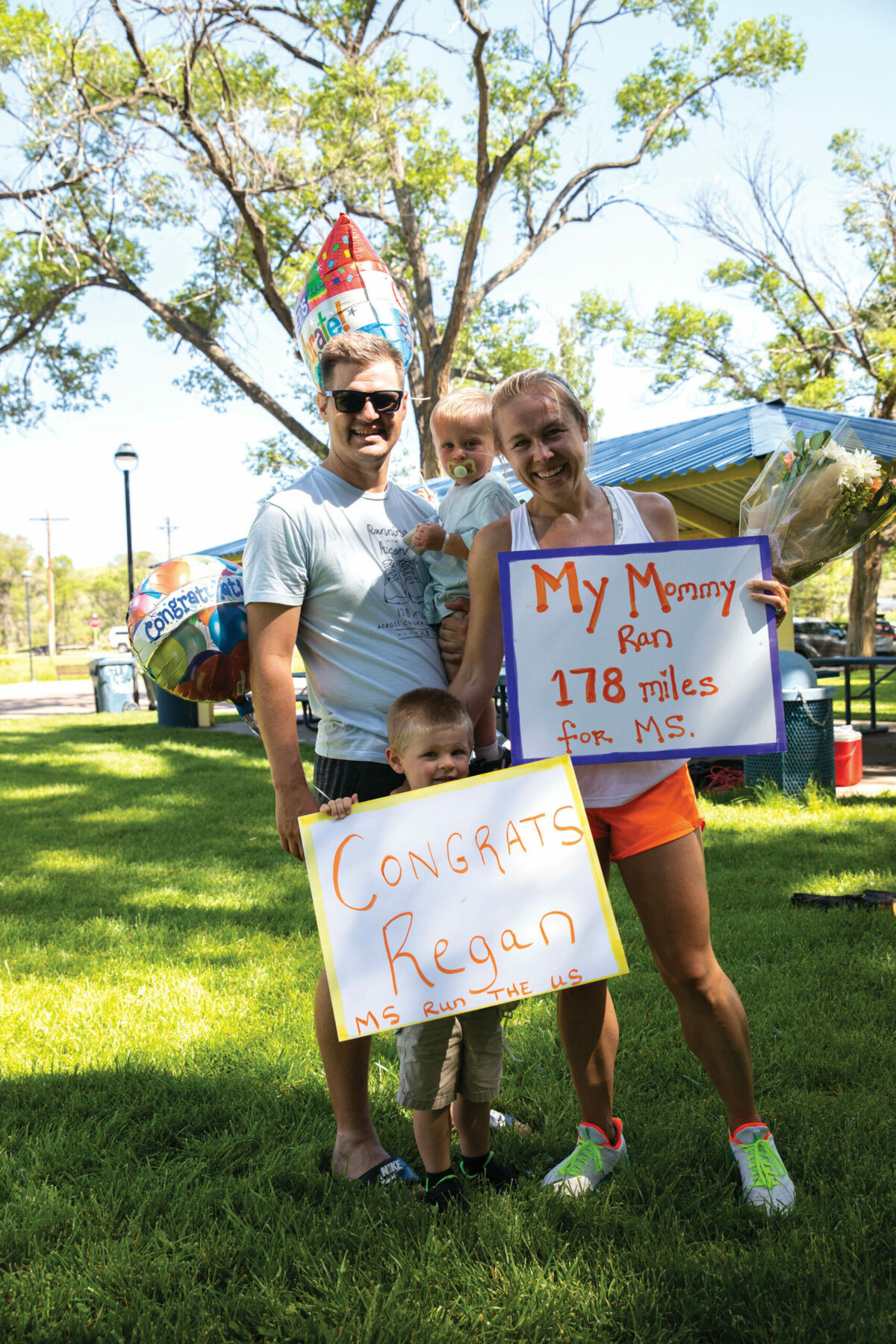
Although Zuege admits she may not know what her health will look like years from now, she maintains a hopeful mindset in every situation and doesn’t let it hold her back from seeing what her body is capable of. Today, she even continues running regularly and though it’s not ultra-marathons every day, she still sets goals to work toward, including running a marathon.
Looking back, Zuege believes that having limited running experience before the relay enhanced her experience, as she was able to start from nothing and push her limits physically and mentally.
“It really is pretty amazing what the body’s capable of,” Zuege says. “(…) Your body is so much more capable than your mind will even allow you to believe.”






